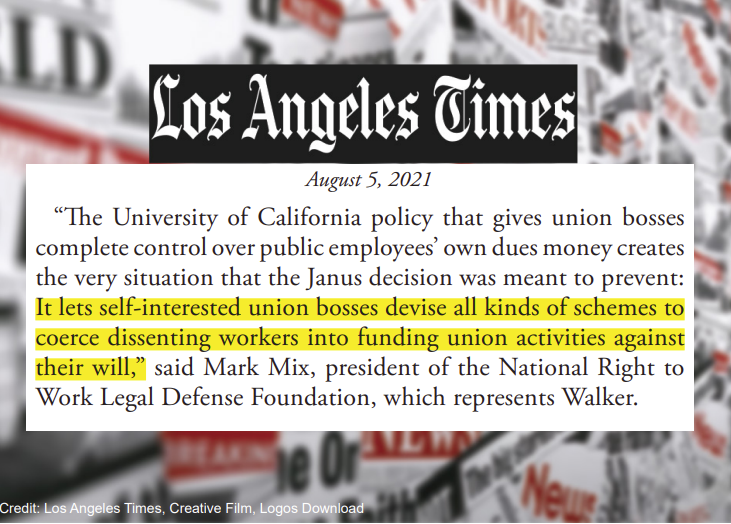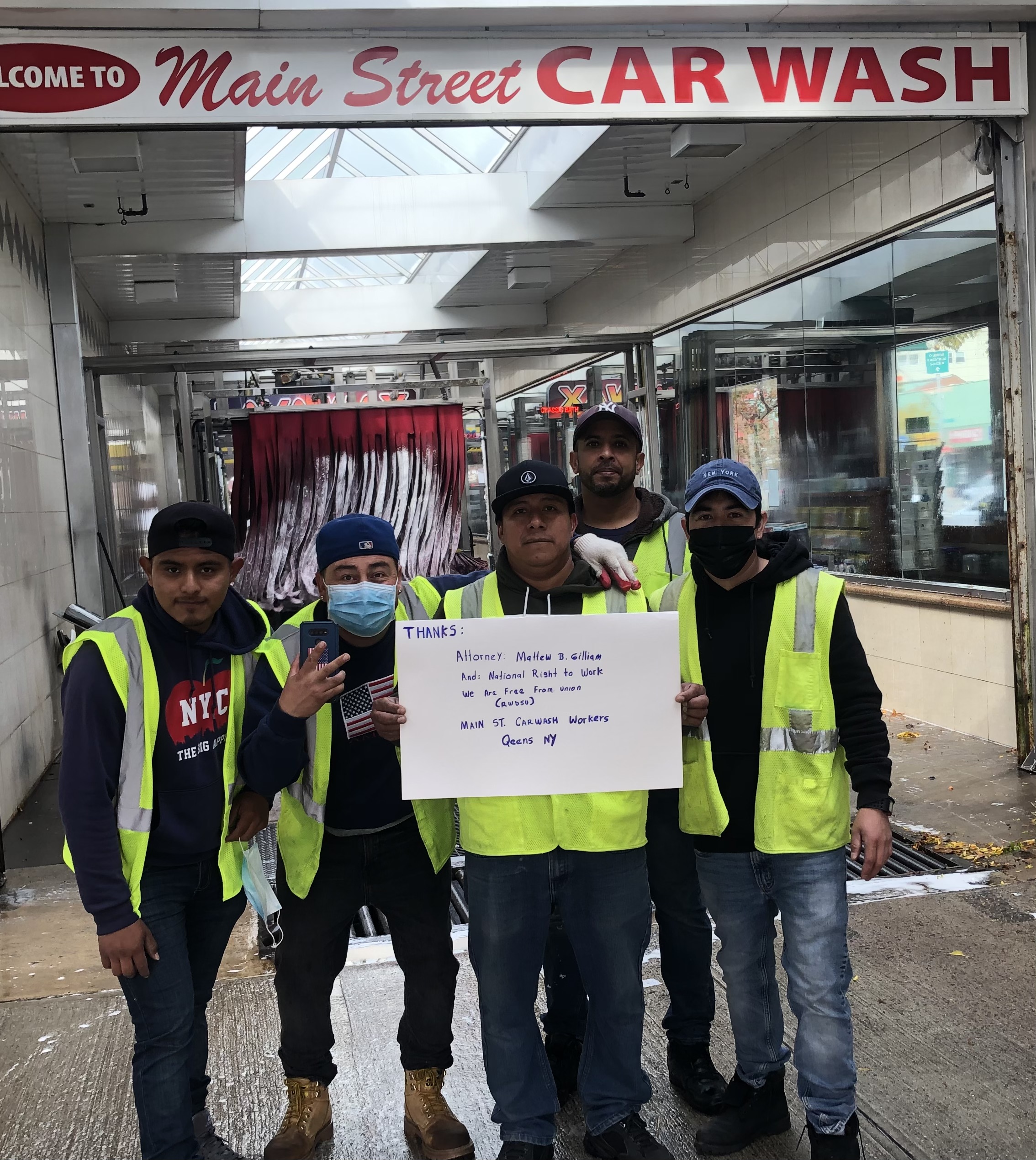At Ninth Circuit, Las Vegas Police Officer Defends First Amendment Right to Stop Funding Unwanted Union
Legal briefs filed for veteran officer rebut union attorneys’ arguments attempting to justify union dues seizures that violate clear Supreme Court precedent
Las Vegas, NV (April 22, 2022) – National Right to Work Foundation staff attorneys just filed the final brief in a Las Vegas police officer’s federal lawsuit defending her First Amendment right to abstain from union dues deductions. The case is now fully briefed and ready to be decided by the U.S. Ninth Circuit Court of Appeals.
Las Vegas Metropolitan Police Department (LVMPD) officer Melodie DePierro is challenging an “escape period” enforced by officials of the Las Vegas Police Protective Association (PPA) union as an infringement of her constitutional rights recognized in the 2018 Foundation-won Janus v. AFSCME Supreme Court decision. DePierro ended her PPA membership in 2020.
The High Court in Janus ruled that forcing public sector workers to subsidize an unwanted union hierarchy as a condition of employment violates the First Amendment. It also declared that union officials can only deduct dues from a public sector employee who has voluntarily waived his or her Janus rights.
DePierro’s Foundation staff attorneys argue in her reply brief that PPA union officials’ “escape period” policy, which forbids her for over 90% of the year from exercising her First Amendment right to cut off union dues deductions, is a blatant violation of Janus.
Further, Foundation attorneys point out that, even though DePierro was a union member years ago, she never consented to being controlled by the “escape period,” which union and police department officials added to the contract without her knowledge. The policy was also absent from the union membership card she signed.
“That a 20-day escape period restriction on employees’ right to revoke was added to a subsequent [contract] does not mean LVPPA can enforce such limitation without first seeking employees’ affirmative consent. DePierro’s First Amendment right against compelled speech and union subsidization would have been protected had LVPPA bothered to seek such consent from her in advance,” Foundation staff attorneys argue.
PPA Union Officials Try to Impose on Officer Contract Provision She Never Knew About
According to DePierro’s complaint, she began working for LVMPD in 2006 and voluntarily joined the PPA union at that time. Her response explains that in 2006 the union monopoly bargaining contract permitted employees to terminate dues deductions “at will.”
In January 2020 she first tried to exercise her Janus rights, sending letters to both union officials and the LVMPD that she was resigning her membership. The letters demanded a stop to union dues being taken from her paycheck.
Her complaint reported that union and police department agents rejected that request because of a union-imposed “escape period” restriction previously unknown to DePierro that limits when employees can exercise their Janus rights. Union agents rebuffed her again after she renewed her demands in February 2020. When she filed her lawsuit, full union dues were still coming out of her paycheck.
DePierro’s most recent filing in the case refutes a number of union arguments, notably contending that her past union membership did not give the union and police department free reign to create new restrictions on her rights. It also criticizes the lower court for ruling that it was “immaterial” that DePierro never consented to the restrictive revocation period.
“DePierro’s membership form is not a blank check for LVPPA and LVMPD to invent and impose new revocation restrictions against her will, resulting in the forceful seizure of hard-earned wages in violation of her First Amendment right not to bankroll a union,” the brief says.
Vegas Police Officer Seeks to Force Union to Return Dues Seized in Violation of Her Rights
DePierro demands that the U.S. Circuit Court declare the “escape period” scheme unconstitutional, forbid PPA and LVMPD from further enforcing it, and order PPA and LVMPD to refund with interest all dues that were unlawfully withheld from her pay since she tried to stop the deductions.
“The Supreme Court was perfectly clear in Janus that public employees must affirmatively waive their First Amendment rights before union bosses take dues from their wages,” commented National Right to Work Foundation President Mark Mix. “That PPA union bosses are refusing to give back money they took in obvious violation of this standard is outrageous, and clearly shows that they value dues revenue over the rights of officers they claim to ‘represent’ – including distinguished veterans like Officer DePierro.”
“The Ninth Circuit Court of Appeals should uphold the correct interpretation of Janus. Foundation attorneys will keep fighting for Officer DePierro until her rights are vindicated,” Mix added.
Wesley Manor Workers Vote Overwhelmingly to Remove Unwanted AFSCME Union Officials from their Workplace
Workers free from unwanted union “representation” as Labor Board certifies decertification vote to toss union bosses
Frankfort, IN (April 19, 2022) – Healthcare workers at the Wesley Manor BHI retirement community in Frankfort, Indiana have won a decertification vote, and successfully removed the American Federation of State, County and Municipal Employees (AFSCME) Local 962 union from their workplace. The workers’ decertification petition was filed with the National Labor Relations Board (NLRB) Region 25 office in Indianapolis, IN with free legal representation from National Right to Work Legal Defense Foundation staff attorneys.
The petition was filed by Robin Davis, an employee of Wesley Manor BHI. The request seeking to end AFSCME union officials’ monopoly bargaining powers at BHI was signed by about 50% of the workers in the bargaining unit, well over the legally required 30% needed to trigger an NLRB-conducted secret ballot vote whether to remove the union. The final decertification vote was 27-16 in favor of removing AFSCME union officials from the workplace. The vote was then certified by the NLRB after union officials’ time for filing objections to the election expired.
Indiana is a Right to Work state, meaning workers cannot legally be required to join or pay dues or fees to a union as a condition of keeping their jobs. However, even in Right to Work states, union officials who have obtained monopoly bargaining control in a workplace are granted the power impose one-size-fits-all union contracts on all workers, including those who opt out of union membership and would prefer to negotiate their own terms of employment.
National Right to Work Foundation staff attorneys have recently assisted workers in numerous successful decertification efforts across the nation, including for workers in Illinois, Oklahoma, and Delaware. Foundation-backed reforms to the rules for decertification elections that the NLRB adopted in 2020 have curtailed union officials’ abuse of so-called “blocking charges” used to delay or block workers from exercising their right to decertify a union. Such charges are often based on unproven allegations made against an employer, completely unrelated to workers’ desire to free themselves of the union.
“The Foundation is happy to have helped the workers at Wesley Manor to exercise their right to free themselves of a union they oppose,” commented National Right to Work Foundation President Mark Mix. “No worker anywhere should be forced under the so-called ‘representation’ of a union they oppose, and Foundation staff attorneys stand ready to assist other workers wanting to hold a decertification election to oust a union they oppose and believe they would be better off without.”
Conagra Brands Workers Seek to Remove Unwanted UFCW Union Officials from their Workplace
Workers file decertification petition with Labor Board to oust United Food & Commercial Worker union
St. Elmo, IL (April 14, 2022) – Production and maintenance employees at Conagra Brands in St. Elmo, Illinois, have filed a petition seeking the removal of United Food & Commercial Workers (UFCW) Local 881 from their workplace. The workers’ petition was filed on April 6, 2022, at National Labor Relations Board (NLRB) Region 14 based in St. Louis, Missouri, with free legal representation from National Right to Work Legal Defense Foundation staff attorneys.
Michelle Brockett, a long time Conagra employee, filed the decertification petition for her co-workers, supported by the signatures she collected to trigger a NLRB-conducted secret ballot vote whether to remove the union. The workers have asked the NLRB to schedule an in-person secret ballot election on April 26 and 27.
Under federal law, when at least 30% of workers in a bargaining unit sign a petition seeking the removal of union officials’ monopoly bargaining powers, an NLRB-conducted secret ballot vote to remove the union is triggered. If a majority of workers casting valid ballots do not vote for the union, the union is stripped of its government-granted monopoly “representation” powers. Those powers let union officials impose contracts on all workers in the workplace, even workers who are not union members and oppose the union. In Illinois, which lacks Right to Work protections that make union financial support strictly voluntary, union officials use their monopoly powers to mandate that all workers pay money to the union or else be fired.
National Right to Work Foundation staff attorneys have recently assisted workers in numerous successful decertification efforts across the nation, including for workers in Illinois, Oklahoma, and Delaware. Foundation-backed reforms to the rules for decertification elections that the NLRB adopted in 2020 have curtailed union officials’ abuse of so-called “blocking charges” used to delay or block workers from exercising their right to decertify a union. Such charges are often based on unproven allegations made against an employer, completely unrelated to workers’ desire to free themselves of the union.
In a previous decertification petition filed against UFCW Local 881 in 2019, prior to the blocking charges reform, union officials used tactics to attempt to block a vote from taking place for Pinncacle Foods Group, ultimately resulting in a delay of the vote for seven months. Although on appeal to NLRB in Washington, D.C., the workers won the ruling that finally let the vote occur, the unjustified delay contributed to union officials prevailing over the workers’ original decertification attempt.
“Thanks to Foundation-backed reforms, UFCW union officials have a much harder time using blocking charges to hinder the rights of workers, so the NLRB should promptly schedule an election for workers at Conagra Brands,” commented National Right to Work Foundation President Mark Mix. “No matter the outcome of this decertification vote, the many workers at Conagra who are opposed to the union should never have been required to fund the activities of union officials with whom they want nothing to do, which is why Illinois workers deserve the protection of a Right to Work law that makes union financial support strictly voluntary.”
Special Alert: Foundation Offers Free Legal Aid to Amy’s Kitchen Employees Targeted by Teamsters Union Bosses
Teamsters’ aggressive top-down organizing campaign includes boycott threat, seeks to impose union on workers without even a secret-ballot vote
Santa Rosa, CA (April 11, 2022) – Following multiple inquiries by Amy’s Kitchen employees, the National Right to Work Legal Defense Foundation has issued a special alert to California and Oregon employees of the vegetarian prepared food company, which is currently the subject of a top-down campaign by Teamsters Local 665 union officials to install union control.
The notice and offer of Foundation staff attorneys’ free legal aid come as Teamsters bosses and allied groups are using increasingly hostile tactics to attack the company, including calling for boycotts of Amy’s Kitchen products. News reports demonstrate many workers oppose the attacks on their employer and want nothing to do with Teamsters union officials.
This union attack strategy is a classic example of a Big Labor “corporate campaign,” in which, rather than seeking to win the voluntary support of workers in a secret-ballot vote, union organizers attack an employer with the goal of having the company assist in imposing the union on the workers, usually via a coercive “card check” scheme. Under National Labor Relations Board (NLRB) rulings, union officials armed with a “card check” deal can bypass the secret-ballot election process and gain power in a workplace simply by submitting untested “union cards” to the employer.
The Foundation’s special legal notice informs Amy’s Kitchen workers of their rights to resist affiliating with the Teamsters union, including that they cannot be required to sign any “union cards.” It further alerts workers that there is a long history of union agents using pressure tactics and misleading workers into signing such cards, and informs workers that should they witness such tactics they should immediately contact the Foundation for free legal aid.
The special alert also apprises Amy’s Kitchen employees of their right to sign counterpetitions expressing opposition to unionization that workers at the facility are currently circulating. Such counterpetitions make it clear workers oppose the Teamsters’ organizing campaign and the Teamster boss-led boycott of Amy’s Kitchen products. The legal notice informs workers that signing a counterpetition can assist in preventing the union from being imposed on them against their will and without a secret-ballot election.
The special alert in both English and Spanish and is available on the Foundation’s website: https://www.nrtw.org/amys-special-notice/ (in English) and https://www.nrtw.org/es/amys-special-notice/ (en español).
Biden Labor Board Targets Independent-Minded Workers
The legal notice comes as Jennifer Abruzzo, the former union lawyer who was installed by President Biden as the NLRB’s General Counsel, is advocating for radical changes to NLRB policies that would expand union bosses’ coercive “card check” powers.
Example after example shows employees are often unaware of the true purpose of “union cards” when pressured by union organizers to sign them. Workers frequently sign merely to get union organizers to leave them alone. In fact, an AFL-CIO organizing guide even admits that a “card check” drive supposedly demonstrating 75 percent support for a union among employees often only translates to a 50/50 chance in a secret-ballot election among the same workers because workers’ signatures made in the presence of one or multiple union agents frequently don’t reflect actual support for the union.
NLRB General Counsel Abruzzo has publicly said she wants to revive the controversial Joy Silk theory, which the NLRB and federal courts rejected a half century ago. Abruzzo seeks to mandate “card check” recognition even if an employer and many workers want the protection offered by a secret-ballot vote before workers are swept into union ranks. As General Counsel, Abruzzo has wide discretion to choose which cases come before the NLRB, and the situation at Amy’s Kitchen might serve as a vehicle for resurrecting Joy Silk.
“If Teamsters officials and their allies truly respected the free and un-coerced choice of the Amy’s Kitchen workers for whom they are claiming to speak, they would not be using such aggressive tactics to try to impose union control from the top down on workers,” commented National Right to Work Foundation President Mark Mix. “Unfortunately, such tactics are being greenlighted by President Biden’s handpicked Big Labor cronies at the National Labor Relations Board, who in their effort to expand forced union dues ranks want to deprive workers of the protection against union intimidation tactics afforded by a secret-ballot vote.”
“Amy’s Kitchen workers who witness or are subjected to Teamsters organizers’ coercive tactics should not hesitate to contact the Foundation for free legal aid,” Mix added.
Chicago-area Firefighters Kick Out Unwanted SEIU Officials
SEIU officials back down, depart Carpentersville facility after worker exposed false claims SEIU made to disenfranchise firefighters opposed to union
Chicago, IL (April 7, 2022) – With free legal representation from National Right to Work Legal Defense Foundation attorneys, Nick Salzmann and his fellow Village of Carpentersville firefighters have forced unwanted Service Employees International Union (SEIU) Local 73 officials out of their workplace.
Salzmann filed a petition in September 2021 backed by the vast majority of his coworkers seeking a vote whether to remove the SEIU union. After the Illinois Labor Relations Board (ILRB) executive director blocked the vote based on specious accusations union officials made of Village of Carpentersville officials, Salzmann filed an appeal that revealed union officials had actually staged the scenario in which the alleged misbehavior arose.
Rather than respond to that appeal, in March, SEIU union officials filed paperwork relinquishing power over Salzmann and his coworkers.
Carpentersville Firefighter’s Appeal Revealed Plot by SEIU Union Bosses to Maintain Control
The ILRB is the Illinois state agency responsible for adjudicating workplace disputes among union officials, Illinois government agencies, and Illinois public employees. SEIU union officials’ so-called “blocking charges,” which they filed against Village of Carpentersville officials in an attempt to delay Salzmann and his coworkers’ requested election, claimed that Carpentersville officials were not following proper bargaining procedures.
However, Salzmann’s appeal showed that in reality it was union officials who disrupted the bargaining process. His appeal maintained that “the union walked away from the bargaining table twice when the Employer could not guarantee that the decertification process would not proceed.”
SEIU bosses’ departures from the bargaining table are a sign union officials were trying to coerce Carpentersville officials into assisting the union in quashing the employee-led decertification effort.
As further evidence of the scheme, Salzmann’s appeal stated that “the Union amended the charges, changing from an ‘impacts and effect’ charge to a ‘failure to bargain’ charge,” suggesting that union lawyers couldn’t demonstrate any connection between Salzmann and his coworkers’ desire to eliminate the union and anything Carpentersville officials did, and had to rely on the (union-caused) bargaining stoppages as their sole allegation against Carpentersville officials.
According to the appeal, approximately 80% of the firefighters favored decertifying the union.
Finally, Salzmann’s appeal contended that the SEIU bosses’ actions disturbed the “laboratory conditions” that should be present for any decertification election. It stated that the “Union’s efforts to compel [the firefighters] to abandon their claim, including telling them they had proceeded improperly in their effort,” along with the union bosses’ willful departures from the bargaining table “caused the factual scenario” that led to the union’s charge.
Foundation President: ILRB Rules Allowed Election Interference by Union Officials
“We’re pleased Nick Salzmann and his coworkers were finally able to oust unpopular SEIU officials from their facility,” commented National Right to Work Foundation President Mark Mix. “However, it’s astonishing that ILRB officials initially blocked Salzmann’s request for a vote to remove the union based on a patently false narrative peddled by SEIU union bosses.”
“Salzmann and his coworkers’ travail is one more reason why government union bosses should not have the power to force workers under their so-called ‘representation’ at all,” Mix added. “No public employee should be ever be required to associate with a private organization like a union just to work for their own government.”
Kentucky Worker Hits Teamsters Union Bosses with Federal Charges for Illegally Seizing Union Dues
Georgia Pacific worker sent multiple letters to stop all payments as allowed by Right to Work law, but Teamsters continued dues collections
Lexington, KY (April 7, 2022) – Pam Ankeny, an employee in the printing department for Georgia Pacific, has filed federal unfair labor practice charges against the International Brotherhood of Teamsters Local 651 union. Ankeny’s charges, which were filed with free legal aid from the National Right to Work Foundation, say that Teamsters union bosses illegally collected union dues after she submitted two letters of revocation.
In July of 2021, Ankeny submitted a resignation and dues check-off revocation letter to union officials. The union responded two weeks later by claiming that Ankeny had missed her “window period” for dues check-off revocation.
In response, Ankeny submitted a second letter in August again reiterating her resignation and check-off revocation. She further requested a copy of the authorization union officials were using to block her request. The union acknowledged that Ankeny’s letter constituted a valid check-off revocation and indicated it would stop dues deductions. However, it failed to provide Ankeny with the requested authorization.
Despite the union acknowledging her valid August 2021 check-off revocation, beginning in January 2022 dues deductions resumed without Ankeny’s authorization and have continued as of the filing of her charges. In addition to the charge against the union, a charge was filed against Georgia Pacific for making the illegal dues deductions.
The charges allege that both practices are unlawful under Section 7 of the National Labor Relations Act (NLRA), which safeguards private sector employees’ right to abstain from any or all union activities. Further, in the 27 states with Right to Work protections, including Kentucky, union membership and dues payments are strictly voluntary.
“While Kentucky’s Right to Work law protects workers from being fired for refusing to pay union dues or fees, unless workers are vigilant, unscrupulous union bosses will still attempt to stuff their pockets with illegal forced dues,” commented National Right to Work Foundation President Mark Mix. “Any worker subjected to illegal union dues seizures should not hesitate to reach out to the National Right to Work Foundation for free assistance in exercising their legal rights to cut off dues payments.”










